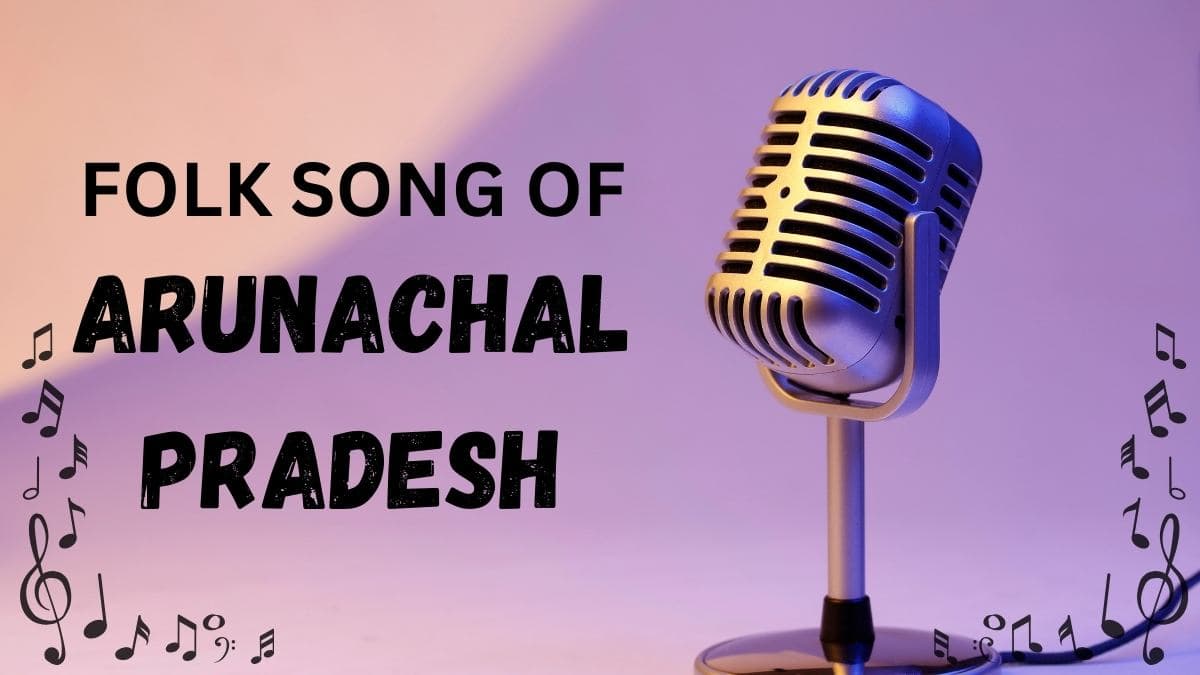Folk Songs of Arunachal Pradesh: Enchanting Lyrics
By Pinkey Sharma |
Date 17-09-2024

Table of Contents
- What are Folk Songs?
- Folk Music of Arunachal Pradesh
- The Instruments of Folk Music of Arunachal Pradesh
- History of the Folk Songs of Arunachal Pradesh
- Ancient formulation
- Modern Times
- Kids Section: Let's Sing a Folk Song!
- How to Appreciate Folk Songs
- The History of Folk Songs of Arunachal Pradesh
- Ancient Times
- Medieval Period
- Colonial Era and Beyond
- Modern Times
- Conclusion
- FAQs
Admissions Open for
Welcome to today's story, dear kids and music lovers! Let us discuss the fantastic and entrancing folk song of Arunachal Pradesh; this is a very beautiful state in the Northeast of India. This state is known for its scenic beauty, rich culture, and varied traditions. Of course, folk music is one of the fascinating aspects of its culture. If melodies and rhythm are magical stories, then folk songs are the soundscapes that link us with the past, introduce us to our heritage, and fill our hearts with happiness. Now, let's continue this musical journey to make us discover Arunachal Pradesh's folk songs.
What are Folk Songs?
Folk music is nothing but the music of the commoner, which restricts itself to normal living, the environment, the celebration of festivals, and emotions. These songs are passed on orally from one generation to the other and conserve in them the culture and tradition of a community. They were sung in local languages and dialects, which makes them unique and special in every way.
Folk Music of Arunachal Pradesh
There are many tribes living in Arunachal Pradesh; that diversity gives the people different cultures and traditions. Thus, folk music is enormously varied in Arunachal Pradesh. Each tribe has its style of music, the kind of instruments used, and songs. Some famous folk songs from Arunachal Pradesh include :
1. Baryi: It is a traditional type of song sung by the Adi tribe. Typically, these songs tell the history of a particular event, myths, and legends of the tribe. Baryi is sung on major ceremonial and festival days.
2. Ponung: It is a folk dance with songs of the Adi and Galo tribes. In general, it is performed by women during festivals and joyous occasions. The dancers form a circle, sing, and move rhythmically.
3. Oola: Oola is a lullaby sung by the Nyishi tribe to pacify the babies to sleep. These lullabies are quite soft and melodious and reflect a mother's love and care for her baby.
4. Aji Lamu: Aji Lamu is a traditional folk opera performed by the Monpa tribe. It brings together the elements of song and dance enacted together in a play and narrates the tales from the Tibetan Buddhist tradition.
5. Himbo: The Himbo songs are sung by the Tagin tribe at the time of harvest. These songs are performed to thank nature for a good harvest and to pray for a successful year ahead.
The Instruments of Folk Music of Arunachal Pradesh
Different forms of traditional musical instruments are used to provide rhythm and melody to the folk song of Arunachal Pradesh. Some of the most common instruments used by them include are:
1. Yoksha: This is a flute made of bamboo, which figured in general use among the Nyishi and the Apatani tribesmen. It produces a sweet and soothing sound, quite befitting the folk melodies.
2. Pempa: This is a drum used by the Monpas. During festivals and ceremonies, it provides a lively rhythm with its rhythmic beats.
3. Bamboo Mouth Harp: Known as "Lingbu," it is used by different tribes residing in Arunachal Pradesh. A characteristic twanging sound on rhythm provides the base to go along with the folk songs.
4. Damru: It is a small, hourglass-shaped drum locally used in folk music of Arunachal Pradesh. Beat in them is maintained by the shaking with the hands and upon shaking, creates a rhythmic energy within the songs.
Folk Songs of Arunachal Pradesh are like windows that open to the lives of the people, their stories, history, culture, and daily incidences. Here are some of the tales that one may come across in the folk song of Arunachal Pradesh:
1. The Hunter's Song - A song sung by the hunter about his hunting adventure within dense forests, capturing the beauty of nature, and the adrenaline from hunting. This song brought the emotions and deaths of the hunts to a respectful feeling for both the animals and the area.
2. The Farmer's Song: The song of the farmer tells of all his hard work in the fields, thanks to the earth for her yield, and prays for blessing on his gathering in. The song epitomizes his belonging to the land and the hopes of prosperity before him.
3. The Love Song: The song of a young couple who sings a song about their love and their dreams about the future. The text of the song describes in a poetic way very tender feelings, and joy from being together in love.
History of the Folk Songs of Arunachal Pradesh
Having roots far back in the past, the history associated with the folk song of Arunachal Pradesh dates to many centuries. Being a tremendous element in the cultural heritage of the tribes of Arunachal Pradesh, these folk songs have paved the way to culminate the tales, traditions, and values of the people.
Ancient formulation
The ancient people of Arunachal Pradesh led a life remarkably close to nature. They depended on oral traditions to maintain and scrupulously passed on from generation to generation a kind of knowledge and culture-specific to that period. Folk songs were one of the greatest means of utilization of the oral reported information of the intended narratives, teachings, or occasions. For example, the Baryi songs of the Adi tribe pertain to the facts and events of the historical and legendary nature to keep the history of the tribe intact.
During the medieval ages, Tibetan Buddhism also brought more new elements into the folk music of Arunachal Pradesh. For instance, the Monpa tribe developed the Aji Lamu folk opera, where the plays are based on Buddhist stories and teachings. This was one period of time when the gush of new cultural influence into a domain brought forth the synchronization between the local traditions and new ideologies, further strengthening the folk music of that region.
Modern Times
Folk music in Arunachal Pradesh continues to be alive in modern times. Despite the march of modern music and technology, the traditional folk songs of Arunachal Pradesh are very popular with the masses. Even today, people sing and chant the songs during various festivals, weddings, and other celebrations, thus retaining the old-world charm of these songs.
Folk songs have a deep influence on the cultural and social life of the people of Arunachal Pradesh. They play a major role in preserving the cultural heritage, norms, and traditions of the different tribes that dwell in the region. How do folk songs affect the local people of that region?
1. Cultural Identity: Folk songs contribute so much to rooting people and maintaining the cultural identity of the people of the state of Arunachal Pradesh. They are reflections of the absolute nature of customs, traditions, and style of life of each of these tribes.
2. Social Bonding: Singing of folk songs together by the people during festivals or any other occasions of celebration helps in closing the social bond tighter and in a better way. It gives a feeling of oneness shared in joy among the people.
3. Emotional Expression - Folk songs are a medium that helps one express their feelings. Be it happiness, sadness, love, or yearning, there is a Folk song to every sentiment.
4. Education and Awareness - Folk songs add to our wisdom and knowledge of the world. They tell great lessons, chronologically based events, and inform us on the existing issues.
Kids Section: Let's Sing a Folk Song!
Hey kids! How about learning a simple folk song from Arunachal Pradesh? Here's a fun and easy song called "Oola", a lullaby from the Nyishi tribe. You can sing this to your little brother or sister to make them sleep. Ready? Let's go!
Oola, Oola, lahiru retail tailyum,
Night has come, the day is done,
Bosi dibo loku lomok tuphim
Bosi dibo loku lomok tuphim.
Wasn't it soothing? Folk songs like "Oola" are not just for pleasure; they also convey how parents feel towards their children.
How to Appreciate Folk Songs
Even in the present day, with access to all sorts of music in this world, folk songs carry their timeless charm. Here are some ways you can enjoy and appreciate the folk song of Arunachal Pradesh:
1. Online Recordings: There are so many recordings of folk songs available online. You can listen to them easily and enjoy the unique melodies and rhythms.
2. Observe Performances: If you get a chance, go and see a performance of folk music of Arunachal Pradesh. Many cultural festivals and events include performances of folk music that are very energetic and full of enthusiasm.
3. Sing Along: Now, try to sing some of the folk songs yourself! Even the lyrics and tunes can be learned from your parents or grandparents or even from available online sources. Singing such songs will expose you to the cultures of such songs.
4. Learn an Instrument: If you are interested in music, maybe give a shot at learning one of the traditional instruments used in the folk music of Arunachal Pradesh. It could be the Yoksha flute, the Pempa drum, or the bamboo mouth harp. Playing these instruments will help you appreciate this music even more.
The History of Folk Songs of Arunachal Pradesh
The folk songs of Arunachal Pradesh have a history that is as rich as it is varied, spread over a few centuries. They take up a significant part of the eclectic cultural heritage of the state and reflect the traditions, beliefs, and histories of the various tribes found within. Let us delve a little bit deeper into some of them here.
Ancient Times
People at that time were very closely associated with nature. There always existed a sound relationship with oral tradition to conserve knowledge and culture of the place. It is in the folk songs that myths and legends help in the transmission of history. A case in point is the Baryi songs of the Adi tribe, which describe heroic deeds and important events about the history and folklore of the tribe and are therefore such songs that keep the history of the tribe always in memory and passed from one generation to another.
Folk songs in various ways have always been an important part of tribal rituals and ceremonies in Arunachal Pradesh. Each tribal community inhabiting this part of the land has its variance regarding the songs performed during the tribal rites of passage, agricultural operations, and various festivals. For example, in the Adi and Galo tribes, the Ponung songs are sung by women on important days such as harvest festivals, among others. Not only do the songs entertain, but they also appreciably beat the major drives of social norms and cultural values.
Medieval Period
During the medieval period, the influence of Tibetan Buddhism began to change the cultural landscape of Arunachal Pradesh, and in particular of the Monpa tribe. The Aji Lamu is a folk opera in which singing, dancing, and acting are performed. It recounts the legends of the Tibetan Buddhist belief system and is evidence of the cultural integration that took place between the indigenous tribes and other Tibetan communities located in the surrounding areas.
Colonial Era and Beyond
Colonial Rule: With the entrance of the era of colonial rulers also came a new era for the region, as it became more exposed to the rest of India and the world. Yet amidst all these changes, the folk traditions of the tribes of Arunachal Pradesh could be preserved. Folk songs remained an integral part of their cultures and identities, prime resources to resist cultural homogenization and hold on to the tribal identity.
Modern Times
In present times, folk songs in Arunachal Pradesh have adapted to contemporary influences while maintaining their traditional spirit. Efforts are put forth to document and record such songs to not let them get lost in the process of globalization and modernization. Folk music festivals and programs on culture are showcasing such traditional songs, therefore marking the reach of a larger audience and also marking their continuity.
Conclusion
The history of folk songs in Arunachal Pradesh speaks of the great cultural heritage and the rich tradition of the state. From ancient times to the present, cultural songs never lost the thread of maintaining storytelling along with intimacy with society. They continue to enchant the listeners by their melodies and stories, thus reflecting the vibrancy of Arunachal Pradesh's culture to future generations.
The folk songs of Arunachal Pradesh have their beauty and importance as a part of the state's culture. They bring to people, relate tales, and keep the traditions alive. Whether it's the historical Baryi, the calm Oola, or the lively Ponung, every Arunachali folk song has its charm and importance. It would mean, the next time you hear a folk song, you remember the musical inheritance of the land and the people of Arunachal Pradesh who, generation after generation, have zealously been promoting this heritage.
FAQs
1. What is the famous folk tale of Arunachal Pradesh?
Some of the stories of the tales of the Arunachal are 'The Fable of the Sun', 'How Lightning Began', 'How Water Came', 'Birth of the Tiger', and 'How the Bees Came into the World' (B.K. Borgohain). In 'The Fable of the Sun' there were Gods named Dainee, Dopoo, Podo, and Payoo. There was nothing called night.
2. What is the state song of Arunachal Pradesh?
Aruṇācal Hamārā (Hindi: [əɾʊˌɳaːt͡ʃəl̪ ɦəˈmaːɾaː]; "Our Arunachal"), is a song written by Bhupen Hazarika which appeared in the 1977 film "Mera Dharam Meri Maa" and has become a de facto state song for Arunachal Pradesh, India.
3. What is the folk song in Arunachal Pradesh?
-
Ja-Jin-Ja: On the occasion of feasts and merriment, during marriages or other social meets, this song is sung. Both men and women sing it in chorus or individually. ...
-
Baryi: It is a song that narrates their history, religious lore, and mythology.
4. What is the traditional folk music of Arunachal Pradesh?
Traditional folk music of Arunachal Pradesh has been defined in several ways: as music transmitted orally, music with unknown composers, music that is played on traditional instruments, music about cultural or national identity, music that changes between generations (folk process), music associated with a people's folklore
5. What is the folk festival of Arunachal Pradesh?
The Losar Festival, the Solung Festival, the Dree Festival, and the Chalo-Loku Festival are the main festivals of Arunachal Pradesh. Arunachal Pradesh is home to several tribes that have distinct cultures and traditions.
We hope you enjoyed reading the above article. Please do not forget to share this blog with your friends and community members to spread awareness of "Folk Songs of Arunachal Pradesh” and “Folk Music of Arunachal Pradesh”
Related Blogs
Folk Songs of Bihar: Explore the folk songs of Bihar, such as Biraha, Jat-Jatin, and Sohar etc.
Folk Songs of Bundelkhand: Discover the folk songs of Bundelkhand, including Rasiya and Bundeli by Orchids.
Folk Songs of Jammu and Kashmir: Explore the folk songs of Jammu and Kashmir, including Rouf, Ladishah, and Chakri.
Folk Songs of Manipur: Discover the folk songs of Manipur, such as Khullong Ishei and Pena Ishei.
CBSE Schools In Popular Cities
- CBSE Schools in Bangalore
- CBSE Schools in Mumbai
- CBSE Schools in Pune
- CBSE Schools in Hyderabad
- CBSE Schools in Chennai
- CBSE Schools in Gurgaon
- CBSE Schools in Kolkata
- CBSE Schools in Indore
- CBSE Schools in Sonipat
- CBSE Schools in Delhi
- CBSE Schools in Rohtak
- CBSE Schools in Bhopal
- CBSE Schools in Aurangabad
- CBSE Schools in Jabalpur
- CBSE Schools in Jaipur
- CBSE Schools in Jodhpur
- CBSE Schools in Nagpur
- CBSE Schools in Ahmednagar
- CBSE School In Tumkur

Call Us to know more about Orchids
Swipe Up

















